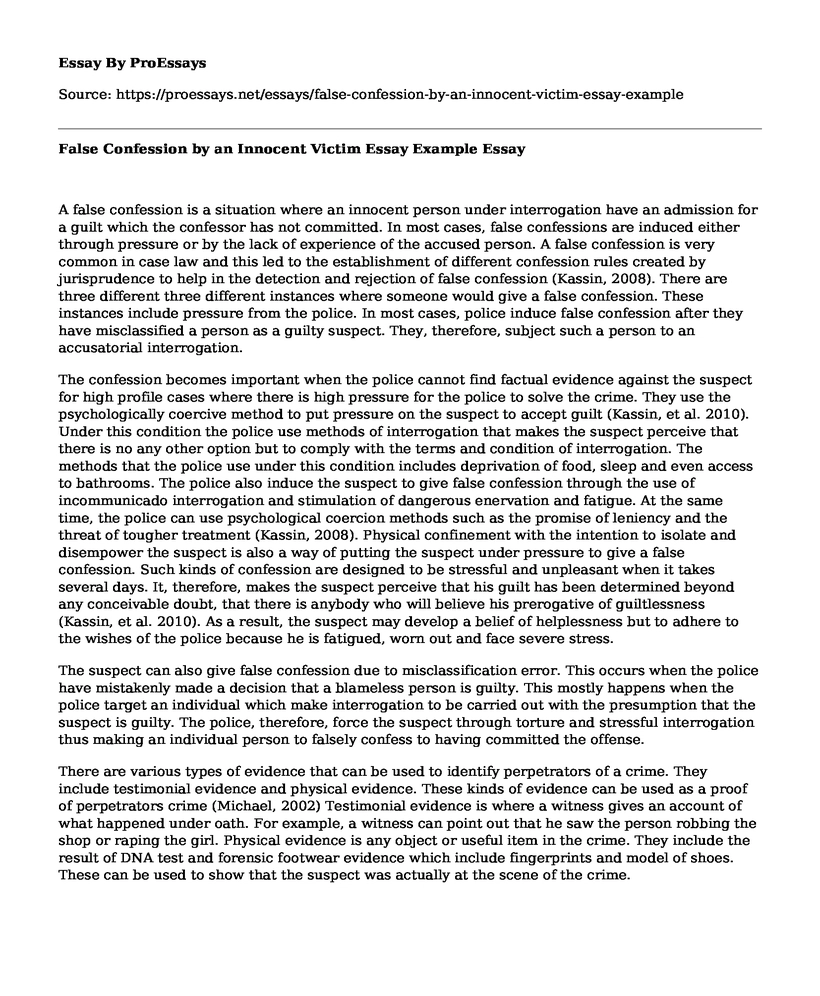A false confession is a situation where an innocent person under interrogation have an admission for a guilt which the confessor has not committed. In most cases, false confessions are induced either through pressure or by the lack of experience of the accused person. A false confession is very common in case law and this led to the establishment of different confession rules created by jurisprudence to help in the detection and rejection of false confession (Kassin, 2008). There are three different three different instances where someone would give a false confession. These instances include pressure from the police. In most cases, police induce false confession after they have misclassified a person as a guilty suspect. They, therefore, subject such a person to an accusatorial interrogation.
The confession becomes important when the police cannot find factual evidence against the suspect for high profile cases where there is high pressure for the police to solve the crime. They use the psychologically coercive method to put pressure on the suspect to accept guilt (Kassin, et al. 2010). Under this condition the police use methods of interrogation that makes the suspect perceive that there is no any other option but to comply with the terms and condition of interrogation. The methods that the police use under this condition includes deprivation of food, sleep and even access to bathrooms. The police also induce the suspect to give false confession through the use of incommunicado interrogation and stimulation of dangerous enervation and fatigue. At the same time, the police can use psychological coercion methods such as the promise of leniency and the threat of tougher treatment (Kassin, 2008). Physical confinement with the intention to isolate and disempower the suspect is also a way of putting the suspect under pressure to give a false confession. Such kinds of confession are designed to be stressful and unpleasant when it takes several days. It, therefore, makes the suspect perceive that his guilt has been determined beyond any conceivable doubt, that there is anybody who will believe his prerogative of guiltlessness (Kassin, et al. 2010). As a result, the suspect may develop a belief of helplessness but to adhere to the wishes of the police because he is fatigued, worn out and face severe stress.
The suspect can also give false confession due to misclassification error. This occurs when the police have mistakenly made a decision that a blameless person is guilty. This mostly happens when the police target an individual which make interrogation to be carried out with the presumption that the suspect is guilty. The police, therefore, force the suspect through torture and stressful interrogation thus making an individual person to falsely confess to having committed the offense.
There are various types of evidence that can be used to identify perpetrators of a crime. They include testimonial evidence and physical evidence. These kinds of evidence can be used as a proof of perpetrators crime (Michael, 2002) Testimonial evidence is where a witness gives an account of what happened under oath. For example, a witness can point out that he saw the person robbing the shop or raping the girl. Physical evidence is any object or useful item in the crime. They include the result of DNA test and forensic footwear evidence which include fingerprints and model of shoes. These can be used to show that the suspect was actually at the scene of the crime.
References
Kassin, Saul M. (2008). "False Confessions: Causes, Consequences, and Implications for Reform". Current Directions in Psychological Science. 17 (4): 249-253. doi:10.1111/j.1467-8721.2008.00584.x
Kassin, S. M.et al. (2010). "Police-induced confessions, risk factors, and recommendations: Looking ahead". Law and Human Behavior. 34 (1): 49-52.
Michael Briody, "The Effects of DNA Evidence on Sexual Offence Cases in Court," Current Issues of Criminal Justice 14, (2002): 159.
Cite this page
False Confession by an Innocent Victim Essay Example. (2022, Sep 26). Retrieved from https://proessays.net/essays/false-confession-by-an-innocent-victim-essay-example
If you are the original author of this essay and no longer wish to have it published on the ProEssays website, please click below to request its removal:
- Paper Example on Juvenile vs. Adult Justice System
- Research Paper on Social Justice and Literacy
- Essay Sample on Jury Selection
- Essay Sample on Israel's Criminal Justice System
- Essay Sample on Death Penalty
- Essay on Title III vs Article 13: Regulating Interception of Communications
- Essay Example on Smart Borders: Quantum Security Solutions for Situational Awareness







